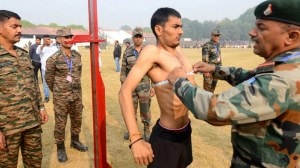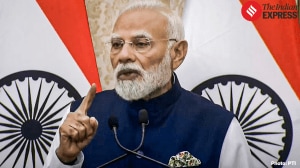When every rural home has its own bulb, tap & toilet
India empowered to me is a nation in which employment is guaranteed to every hand, a nation where food security is assured, where everyone h...

India empowered to me is a nation in which employment is guaranteed to every hand, a nation where food security is assured, where everyone has a place of shelter, every household has access to a safe source of drinking water and possesses a clean toilet, a nation whose agricultural fields have assured sources of irrigation, a nation whose villages have basic infrastructure such as road connectivity, electricity, telecommunication connectivity, proper health and education services, a nation with facilities for easy access to and freedom for exchange of knowledge and information and a nation with widespread and deep-seated grassroot democratic institutions.
India is empowered with a population resource of over 100 crores which constitutes 16 per cent of the world’s population but has only 2.5 per cent of the world’s area as its territory. Incidence of poverty is as high as 27.09 per cent in our rural areas and 23.62 per cent in urban areas. The population below poverty line is living with income levels below Rs 327.56 per capita per month.
This section of the society needs empowerment in terms of right to work and we, therefore, need to develop policies which provide guaranteed job opportunities to job seekers. The National Rural Employment Guarantee Programme is an initiative in this direction but the test lies in its proper implementation which could be facilitated by a mature local self-government in the form of empowered panchayati raj institutions assisted by development functionaries, sensitive to needs.
Mahatma Gandhi said that ‘‘poverty is the worst form of violence’’. The condition of assetlessness, which is the root cause of poverty in the country, manifests in various forms: increase in stratification, class struggle, Naxal movement, caste tension and social disorder.
Our policies require focused provisions for welfare of the vulnerable sections, equitable distribution of assets. Those sections of the society who have lagged behind because of lack of opportunities, economic reason and social stratification, are required to be given a proper environment. This will ensure they also feel they are respected citizens of the country, committed and proud of their nation.
Mother Teresa once said that ‘‘we think sometimes that poverty is only being hungry, naked and homeless. The poverty of being unwanted, unloved and uncared for is the greatest poverty. We must start with our own houses to remedy this kind of poverty’’. The entire environment needs to be sensitized towards togetherness of fellow citizens. There are no two opinions about the fact that prosperity is the outcome of hard work and timely exploration of opportunities but it is also a fact that a vast chunk of Indian poors have lack of opportunities. The social order should, therefore, be sensitive enough.
In a country where poverty permeates over one-third of the rural poor, where untouchability continues despite stringent laws and public rage against its practice, where opportunities continue to be unequal, the imagination of an empowered society would be somewhat unrealistic. Empowerment requires economic egalitarianism and focus in the implementation of developmental programmes.
Economic programmes require to be structured so as to provide expanding space for vulnerable sections of society i.e. SC/ST, women, minorities and other weaker sections with suitable preferential treatment. Economic programmes should have more social and participatory content to facilitate more and more people-involvement. Wage employment and self-employment programmes re examples of such micro developmental structures and their expansion will lead to permeation of micro industries at the grassroot level.
The planning machinery responsible for implementation of these programmes are required to provide technology and skill support so as to improve productivity. Given the decentralized nature and involvements of these programmes, there will be need for very close monitoring and follow up so that the fruits are not taken away by ineligible elements.
Our nation has shown remarkable improvement in various socio-economic development parameters in last fifty years, but the rich-poor divide is widening. We need to have a system totally transparent, poor-friendly and procedures completely fair. The roots of backwardness also lie in poor level of awareness in the society. Therefore, the country really needs to put in a lot of effort to make society aware and responsive.
A country whose economy is predominantly based on agriculture cannot be termed as empowered unless the backbone of the economy, i.e., farmers get due remunerative prices for farm products. Over a period of time, the cost of inputs has had a rising trend whereas the prices of product, which the farmers get, have been broadly constant. The rising trend, if any, is very marginal in terms of benefits to farmers and it benefits the middlemen.
While trading is part of economic opportunity, the same should not amount to exploitation. Since production has to precede trade, preferential treatment for profit opportunities to the producer is essential even for the trader to sustain his trade. The role of the regulator is, therefore, paramount.
The status of rural electrification manifests the divide in society. Still, vast areas in villages do not have electricity and supply of reliable energy at affordable costs.
In our country, we still have about 1.5 crore families without proper place of shelter. The condition of slum dwellers is still more miserable. The government has taken initiatives to construct houses on a large-scale but the problem is multiplying because of unchecked growth in population and division of joint families into small families, almost at the same rate at which new houses are getting added.
In our country, about 5,000 villages still have no source of safe drinking water and some 50,000 villages have insufficient supply of water. 2.16 lakh habitations are affected by water quality problems. India empowered must envisage a safe and assured source of drinking water to every household.
Sanitation coverage in the country was 22 per cent in 2001 which has now gone up to 33 per cent. The problem of people defecating in the open is still very high, more prevalent in chronic poverty ridden areas. The Millennium Development Goal stated by the United Nations envisages total sanitation coverage by 2015. India empowered must have individual sanitation coverage to each and every household. This is essential for the dignity of our women population.
In order to improve living conditions in rural areas, check the rural-urban migration and ensure linkage from field to market, every village must have provision of all-weather road connectivity, telecommunication connectivity, electricity, satisfactory standard of health and education and other social services.
Empowered India ought to have world-class infrastructure to compete with world community. To achieve these goals, a high level of knowledge base in citizens is required to ensure that the funds being passed on to implementing agencies are utilized properly.
In a vast country like India, natural calamities such as drought, flood, tsunami, snow, earthquake, etc. have played havoc. In all these calamities, from the viewpoint of an independent observer, it appears that the country has accepted them as an act of nature. For an empowered mind, nature is a teacher. Co-existence of man with nature is an age-old practice.
In a fast changing technological era, we are required to e ready to withstand, absorb, endure and meet eventualities caused by these natural calamities effectively so that their effect on society is minimized.
For example, floods in North Bihar are a perennial problem. Every year, 22 districts get flooded, causing huge loss of property, lives, farmlands and infrastructure. A disaster management system equipped with data, technology and resources can meet ravages of cyclic natural disasters.
According to me, empowerment in the Indian context means economic strength with cultural diversity. Empowered India will be a country where every hand has access to employment and every face smiles by the end of the day, self-sufficient.



- 01
- 02
- 03
- 04
- 05




























